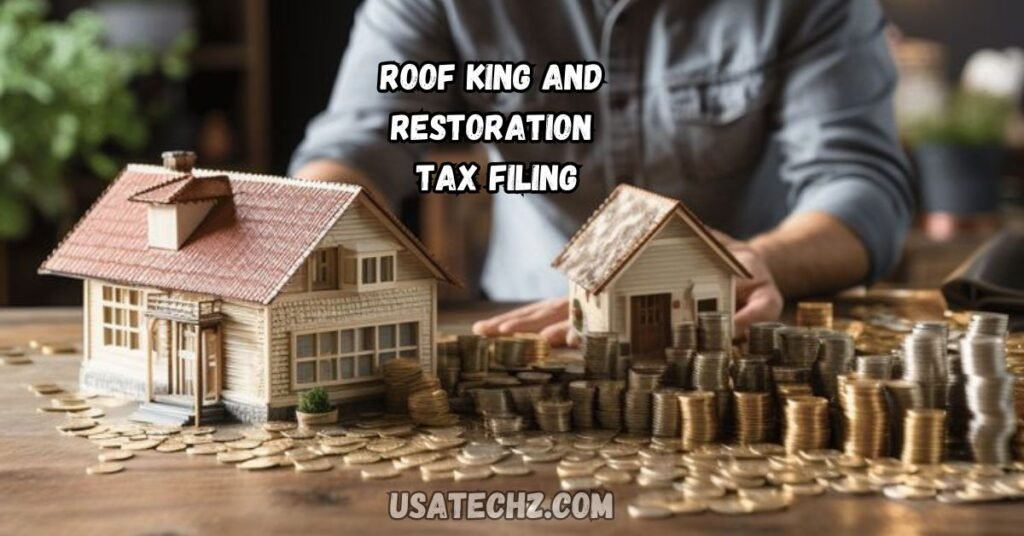When it comes to maintaining your home, understanding Roof King and restoration tax filing can lead to significant savings come tax season. If you’ve recently invested in roof repairs or a full restoration, it’s essential to know how these costs can impact your taxes. Properly navigating this process can help you maximize your benefits and minimize your financial burden.
Many homeowners are unaware that certain roof restoration expenses can qualify for deductions or credits. Whether you’re dealing with damage from a storm or simply upgrading your roof, understanding the ins and outs of Roof King and restoration tax filing is crucial. This guide will break down what you need to know to ensure you’re making the most of your investment.
What is Roof King and Restoration Tax Filing?
Roof King and restoration tax filing refers to the important process of managing tax obligations after you have made roof repairs or improvements. When you face damage to your roof, whether from storms, age, or other factors, hiring a reliable company like Roof King is essential. Understanding how to handle these expenses when filing your taxes can significantly help you save money. Some costs related to roof repairs may be tax-deductible, which means you could potentially pay less to the IRS at the end of the year.
It’s crucial to know what types of roof king and restoration tax filing expenses might qualify for deductions. Not all repairs are deductible, and it’s especially important to recognize the difference between regular maintenance and capital improvements. For instance, if you simply patch a leak, that is usually not deductible. However, if you replace your entire roof or make significant upgrades that increase your home’s value, those expenses may qualify as capital improvements, which can be beneficial during tax season.
By understanding Roof King and restoration tax filing, homeowners can make informed decisions about their repairs and potential tax savings. The more you know about what can be deducted, the better you can prepare your finances. This knowledge is not just about saving money; it’s about making wise investments in your home that can pay off both now and in the future. In the following sections, we will explore various aspects of tax filing related to roofing, helping you navigate this complex but rewarding area.
Are Roof Repairs Tax Deductible? Understanding the Basics
Many homeowners often wonder if roof king and restoration tax filing repairs can be deducted from their taxes. The answer isn’t straightforward, as it depends on various factors. Generally, regular roof repairs for personal residences are not tax-deductible. However, if you own a rental property or a business, the rules change significantly. In those cases, costs associated with maintaining or repairing a roof may often qualify as deductible expenses. This means that when you spend money fixing the roof on a rental property, you could reduce your taxable income, leading to potential tax savings.
To determine if your roof king and restoration tax filing expenses can be deducted, it’s essential to distinguish between routine repairs and capital improvements. Routine repairs, like fixing minor leaks or replacing a few shingles, usually do not qualify for deductions. On the other hand, capital improvements are significant upgrades that enhance your property’s value or extend its lifespan. For example, replacing an entire roof with new materials is typically considered a capital improvement. Such improvements may increase the basis of your home, which could benefit you when you sell it, potentially reducing capital gains tax.
To make the most of your deductions, it’s vital to keep detailed records of all your roofing expenses. Save receipts, invoices, and any documentation from contractors, such as roof king and restoration tax filing. This thorough record-keeping will prove invaluable during tax season. Being prepared can lead to significant savings, ensuring you don’t miss out on potential deductions when filing your taxes.
Differentiating Between Repairs and Capital Improvements
Understanding the difference between repairs and capital improvements is crucial when it comes to taxes. Repairs typically fix minor issues and are necessary for maintaining your home. For instance, if you patch a leak in your roof or replace a few shingles, those are considered repairs. Unfortunately, these costs generally do not qualify for tax deductions. They are seen as routine maintenance rather than expenses that increase the value of your home.

Roof king and restoration tax filing Capital improvements are significant upgrades that enhance the value or extend the useful life of your property. Replacing your entire roof with a new, energy-efficient system can be classified as a capital improvement. This kind of work can increase the overall value of your home and may also qualify for tax benefits. When you complete such improvements, you can add the costs to your home’s basis, which could help reduce capital gains taxes when you eventually sell your property.
It’s essential to keep accurate records that differentiate between these two types of expenses. A simple way to do this is to document each project’s purpose. If you’re unsure whether a project is a repair or an improvement, consult with a tax professional. They can help clarify which costs may be deductible under current tax laws. This distinction can significantly impact how you file during roof king and restoration tax filing, potentially leading to substantial savings.
How Casualty Loss Deductions Can Benefit You
Casualty loss deductions are vital for homeowners who experience sudden damage, such as from a storm, fire, or other unexpected events. If your roof sustains damage that is not fully covered by insurance, you might be eligible to claim a casualty loss deduction. This deduction can help offset the financial burden of costly repairs, allowing you to recover some of the expenses incurred.
To qualify for a casualty loss deduction, the damage must be sudden and unexpected. For example, if a severe storm causes a tree to fall on your roof, that could be considered a casualty loss. However, if the damage is due to regular wear and tear or neglect, it wouldn’t qualify. It’s important to keep detailed documentation of the damage and repair costs. This includes photographs, repair invoices, and any correspondence with your insurance company.
When you file for a casualty loss deduction, your tax professional will guide you through the process. They will help you complete the necessary forms and ensure that you meet all requirements. Be aware that there are thresholds for claiming these deductions, and your insurance reimbursement can affect the amount you can claim. Understanding how casualty loss deductions work is essential for homeowners, especially during roof king and restoration tax filing. By taking advantage of these deductions, you can alleviate some of the financial pressure caused by unexpected damages.
Maximizing Your Benefits: Key Tax Credits for Energy-Efficient Roofing
Installing energy-efficient roofing materials not only helps the environment but also provides potential tax credits for homeowners. These tax credits can significantly reduce your tax liability, directly lowering the amount you owe to the IRS. Unlike deductions that merely lower your taxable income, credits give you a dollar-for-dollar reduction in your tax bill, making them highly beneficial for homeowners looking to improve their roofs.
When working with a reputable company like roof king and restoration tax filing, ask about energy-efficient options that might qualify for tax credits. For instance, roofs that meet Energy Star guidelines or utilize sustainable materials may be eligible for various tax incentives. By choosing these eco-friendly options, you not only contribute to a healthier planet but also enhance your financial situation during tax season.
To take full advantage of these tax credits, you must keep careful records of the materials used and the costs incurred. Documentation such as receipts and installation contracts will be crucial when filing for these credits. Consult with a tax professional to ensure you are claiming all the credits available to you. Understanding the potential for tax credits can make a significant difference in your overall savings, especially during roof king and restoration tax filing.
You Can Also Discover: Polyurea Roof 4K Photos
Essential Documentation for Roof King and Restoration Tax Filing
When it comes to roof king and restoration tax filing, maintaining organized documentation is critical. Good record-keeping not only helps ensure that you can claim deductions and credits but also protects you in the event of an audit. When you hire Roof King for roofing services, it’s important to keep every invoice, contract, and receipt related to the work done. These documents serve as proof of your expenses and can be essential when filing your taxes.
Creating a dedicated folder for all roofing-related paperwork is an effective way to stay organized. Within this folder, categorize documents by type—receipts for materials, invoices for labor, and contracts for the work performed. This will make it easy to find what you need when it’s time to file your taxes. Additionally, be sure to note the dates of the work completed and the total costs associated with each project.

Accurate documentation can help you maximize your tax benefits. For example, if you can prove that your roof improvements qualify as capital expenses, you can claim those deductions accordingly. Having everything in order also alleviates stress during tax season, allowing you to focus on filing accurately. By prioritizing good record-keeping practices, you ensure a smoother roof king and restoration tax filing experience, ultimately leading to greater peace of mind.
Common Mistakes to Avoid When Filing Your Taxes
Filing taxes can be daunting, and many homeowners make common mistakes that can lead to missed savings. One of the biggest errors is not understanding which costs are deductible. Many people overlook the fact that certain roof repairs may qualify for tax deductions, leading them to pay more than necessary. It’s important to familiarize yourself with the tax rules related to home improvements and repairs so that you can take full advantage of potential savings.
Another frequent mistake is inadequate documentation. Without proper receipts and invoices, it can be challenging to prove your expenses. Always save all related documents and organize them neatly to make filing easier. If you fail to keep track of your expenses, you may miss out on significant deductions or credits that you could have claimed.
Consulting a tax professional can help you avoid these common pitfalls. They can guide you through the intricacies of tax laws and help you identify which expenses qualify for deductions. This expert advice can be invaluable, especially during roof king and restoration tax filing. By being aware of common mistakes and seeking guidance, you can ensure a more successful and less stressful tax filing experience.
Understanding the Impact of Roof Restoration on Property Value
Roof king and restoration tax filing can significantly enhance your property’s value. A well-maintained or newly replaced roof not only improves your home’s appearance but also protects it from potential future damage. This aspect is particularly appealing to prospective buyers, making your property more attractive in the real estate market.
Investing in roof restoration can lead to a substantial return on investment (ROI). For example, if you choose high-quality materials and improve the overall energy efficiency of your roof, you may see a higher selling price if you decide to sell your home later. Homebuyers often prefer properties that require less immediate maintenance, making your investment in roof restoration a strategic financial move.
Understanding how roof restoration impacts property value is essential for homeowners. Whether you’re planning to sell soon or looking to stay in your home long-term, knowing the potential benefits can help you make informed decisions. Properly maintaining your roof and investing in necessary improvements can provide long-term benefits, especially when it comes to roof king and restoration tax filing. This knowledge empowers you to take charge of your home’s value and make decisions that positively impact your finances.
How to Keep Accurate Records for Roof King and Restoration Tax Filing
Keeping accurate records is essential for roof king and restoration tax filing. When you invest in roof repairs or improvements, saving all related documents is critical for maximizing your tax benefits. When you hire a company like Roof King, ensure you keep every receipt, invoice, and contract pertaining to the work done. These documents serve as proof of your expenses and can make a significant difference when it comes to claiming deductions or credits.

Creating a dedicated folder for all roofing-related paperwork can help you stay organized. Divide your documents into categories, such as receipts for materials, invoices for labor, and contracts for the work completed. This will make it easier to locate necessary documents when tax season arrives. Additionally, don’t forget to note the dates of work completed and total costs associated with each project.
Accurate record-keeping not only benefits your roof king and restoration tax filing but also helps you stay informed about your home investment. Understanding how much you’ve spent on roof repairs and improvements allows you to make better financial decisions moving forward. This organized approach ensures that you’re well-prepared for roof king and restoration tax filing, ultimately leading to a smoother and more successful tax season.
The Benefits of Choosing Roof King for Your Restoration Needs
Choosing Roof King for your restoration needs comes with many advantages that extend beyond just quality workmanship. When you hire Roof King, you’re working with experienced contractors who know how to handle a variety of roof king and restoration tax filing, from minor repairs to complete roof replacements. This expertise ensures that your roof will be restored to the highest standard, providing you peace of mind and long-lasting protection for your home.
Another key benefit of working with roof king and restoration tax filing is their assistance with insurance claims. Navigating the insurance process can be stressful and confusing, especially after experiencing damage. Roof King’s team often helps homeowners with the claims process, simplifying your experience and ensuring that you get the coverage you deserve. This support can be incredibly valuable during a challenging time, allowing you to focus on your family and home instead of paperwork.
By selecting Roof King, you’re making a wise investment in both your home and your financial future. Quality roofing work can increase your home’s value, while the assistance with insurance claims helps ensure that you can take full advantage of any potential tax benefits during roof king and restoration tax filing. With Roof King, you’re not just getting a service; you’re gaining a partner committed to your home’s well-being and your financial peace of mind.
Conclusion
Understanding roof king and restoration tax filing can help you save money and make better choices for your home. When you know what costs are deductible, you can make smart decisions about repairs and improvements. Remember, not all roof work is the same; knowing the difference between repairs and capital improvements is key. Keeping good records and asking for help when you need it will make filing your taxes much easier.
Choosing a company like Roof King can also make a big difference. They provide quality work and help with the tricky parts of insurance claims. This support can save you time and stress. By taking the right steps now, you can protect your home and enjoy potential tax benefits later. So, whether you are fixing a small leak or doing a big roof project, stay informed and make the best choices for your home!
FAQs
Q: Can I deduct my roof repairs on my taxes?
A: It depends. Roof repairs are usually not deductible for personal homes, but they may be for rental or business properties.
Q: What is considered a capital improvement for roofing?
A: A capital improvement is a significant upgrade that increases the value or lifespan of your roof, like a full roof replacement.
Q: Can I claim a casualty loss deduction for storm damage?
A: Yes, if the damage is not fully covered by insurance, you may be able to claim a casualty loss deduction on your taxes.
Q: How should I keep records for roof repairs?
A: Keep all receipts, invoices, and contracts in a dedicated folder. Organizing them by category will help during tax season.
Q: Does Roof King help with insurance claims?
A: Yes, Roof King assists homeowners with filing insurance claims, making the process easier after roof damage.
Q: What tax credits are available for energy-efficient roofing?
A: You may qualify for tax credits under programs like the Energy Star credit if you install energy-efficient roofing materials.
Q: Why is it important to understand roof restoration tax filing?
A: Knowing how to file taxes related to roof restoration can help you save money and maximize your tax benefits.